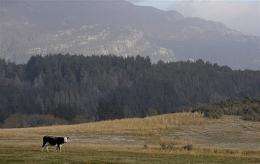Chilean eruption highlights risk from 'rhyolitic' volcanoes

Magma from a Chilean volcano shot through Earth's crust at around a metre (3.25 feet) per second, a speed highlighting the perils from so-called rhyolitic volcanoes, scientists reported on Wednesday.
Volcanoes in this category provide some of Earth's most explosive events.
They are characterised by a dome of hardened magma which covers their central vent and can blow with catastrophic force, often with scant warning.
They include Vesuvius, Krakatoa and Mount St. Helens -- names that have gone down in history for inflicting loss of life and massive damage.
In the case of the Chaiten volcano, in Chile's northern Patagonia, local residents at a town 10 kilometres (six miles) from the cone felt earthquakes at about 8 pm on April 30, 2008 that were powerful enough to knock objects off shelves.
The following day, the volcano erupted. On May 2, the volcano's lid, a caldera, was ripped off in a mighty blast.
Further eruptions continued for a week, distributing a blanket of ash in a wide swathe near the volcano.
Jonathan Castro of France's National Centre for Scientific Research (CNRS) and Donald Dingwell, of the Ludwig Maximilian University in Munich, Germany, collected ash samples and analysed crystals that are formed under specific conditions of pressure, temperature and water content.
They calculate that the magma took just four hours to ascend from a depth of more than five kilometres (three miles).
The molten rock surged upwards in the range of one metre (3.25 feet) per second before dispersing in an "explosive fragmentation" when it reached the surface.
"This result has implications for hazard mitigation because the rapidity of ascending rhyolite means that future eruptions may provide little warning," they write in the British journal Nature.
The pair call for rhyolitic volcanoes that have not erupted since the last Ice Age, around 10,000 years ago, to be monitored.
"In more densely populated regions this would be essential to avoid a major volcanic disaster," they say.
(c) 2009 AFP


















